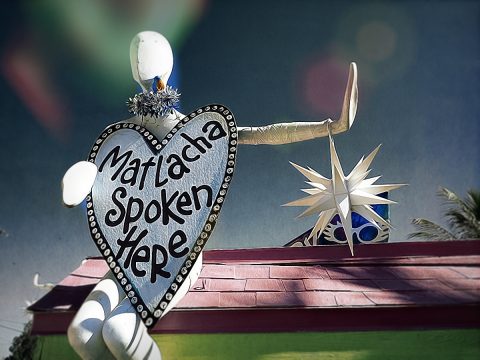None of the characters in the story are named. Instead, they’ve mostly got kind of iconic titles—grandma, mother, father—and then the little girl is “her.” How did you arrive at nameless characters?
I wanted to raise the question of whether their relationships to each other are permanent or not. For the little girl in particular, I felt like her grandmother would refer to her as “my granddaughter” instead of using her name. “My granddaughter” conveys ownership and connection, both of which the grandmother is about to lose.
It’s also interesting to see that most of the conflict between characters is happening off stage—between the grandmother and the mother, between the grandmother and the father (her son). Yet it seems to me that those conflicts play out somewhat through the on-stage relationship, ostensibly loving, between the grandmother and grandchild. How did you decide what to focus on?
The idea of this story came from a friend’s photo on Facebook. It was a picture of her granddaughter at a playground. The story itself has nothing to do with this particular friend or her relationship to her granddaughter, but the image really stuck with me. It was kind of a run-down little playground, and I started thinking about a grandmother who spends her day taking her granddaughter to various playgrounds. I wanted the heart of the story to be those two driving around and playing, but the story needed some conflict as well. There needed to be some weight to the grandmother and granddaughter spending the day together, which is how the off-stage drama came to be.
How did you come to choose the title “Make-Believe”? Obviously it most directly refers to the pretend games the grandmother plays with her grandchild, but the grandmother is, I think, doing some bigger, deeper pretending in her life, particularly about her son. How did you come to a title that worked on both levels?
Credit for the title goes to Tara Laskowski (the editor of SLQ). The working title was “All The Things,” which I was never crazy about. When I finished revising the story, I sent a list of possible titles to Tara, none of which were very good, to be honest, and she suggested ”Make-Believe.” I immediately loved it because, as you say, it works on two levels.
What should a good short story do for (or to) the reader?
A great short story should break your heart. Or punch you in the gut. It should make the reader feel some emotion or connection. The best short stories are the ones you find yourself thinking about long after you’ve read them. They linger.



 The core workshop of SmokeLong Fitness is all in writing, so you can take part from anywhere at anytime. We are excited about creating a supportive, consistent and structured environment for flash writers to work on their craft in a community. We are thrilled and proud to say that our workshop participants have won, placed, or been listed in every major flash competition. Community works.
The core workshop of SmokeLong Fitness is all in writing, so you can take part from anywhere at anytime. We are excited about creating a supportive, consistent and structured environment for flash writers to work on their craft in a community. We are thrilled and proud to say that our workshop participants have won, placed, or been listed in every major flash competition. Community works.